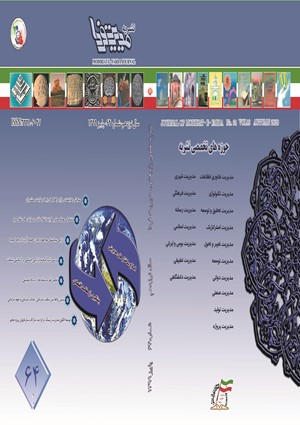بررسي تاثير اجحاف در محيط کار بر سايش اجتماعي کارکنان با نقش ميانجي نقض قرارداد روان¬شناختي
محورهای موضوعی : مدیریت تحقیق و توسعه
1 - دانشگاه پیام نور
کلید واژه: اجحاف در محيط کار, سايش اجتماعي, قرارداد روان شناختي, کارکنان.,
چکیده مقاله :
از عوامل مؤثر بر بروز پديدههايي مانند رفتارهاي انحرافي ،بدبيني و عدم رضايت شغلي در سازمان ادراک کارکنان به عدم تحقق وعدههاي دادهشده توسط سازمان است که با نقض قراردادهاي روانشناختي اتفاق ميافتد، يکي از عوامل اثرگذار بر اين پديده وجود اجحاف حاصل از بيعدالتي و رفتارهاي سرپرستان در محيط کار است، بر اين اساس هدف پژوهش حاضر تحليل تأثير اجحاف در محيط کار بر نقض قرارداد روان شناختي با نقش ميانجي سايش اجتماعي انجام شده است ، پژوهش حاضر ازنظر هدف کاربردي و براساس نحوه گردآوري دادهها توصيفي است و شيوه اجراي آن پيمايشي محسوب ميگردد. جامعه آماري پژوهش حاضر کارکنان شرکتي يک سازمان دولتي به تعداد 400 نفر مي باشد که با توجه به محدود بودن تعداد جامعه آماري با استفاده از جدول جوامع محدود 196 نفر به عنوان نمونه و به روش تصادفي ساده انتخاب شدند. براي گردآوري داده هاي اوليه و اطلاعات جهت تأييد يا رد فرضيه هاي پژوهش از روشهاي ميداني استفاده شده است. از ميان روشهاي متعددي که براي تعيين اعتبار اندازهگيري وجود دارد روايي صوري و روايي محتوايي براي اين پژوهش مورد استفاده قرار گرفت.براي سنجش پايايي از ضريب آلفاي کرونباخ و پايايي ترکيبي استفاده شد. در اين پژوهش داده هاي جمع آوري شده توسط پرسشنامه با استفاده از نرم افزار SPSS و lisrel براي انجام تحليل هاي آماري مورد تجزيه و تحليل قرار گرفت. نتايج نشان مي دهد که اجحاف در کار به ميزان 41/0 بر سايش اجتماعي؛ به ميزان 71/0 بر نقض قرارداد روان شناختي و در نهايت سايش اجتماعي با ضريب مسير 69/0 بر نقض قرارداد روانشناختي در سطح اطمينان 95 درصد تاثير معناداري دارند.
One of the effective factors on the occurrence of phenomena such as deviant behaviors, pessimism and job dissatisfaction in the organization is the perception of employees about the non-fulfillment of promises given by the organization, which occurs in violation of psychological contracts. Supervisors are in the workplace. Therefore, the purpose of this study is to analyze the effect of Workplace Bullying on the violation of psychological contracts with the mediating role of social undermining. It is a survey. The statistical population of the present study is the corporate employees of a government organization of 400 people. Due to the limited number of statistical population, 196 people were selected as a sample using a simple random sampling table using a simple random method. Field methods have been used to collect initial data and information to confirm or refute the research hypotheses. Among the various methods used to determine the validity of the measurement, face validity and content validity were used for this study. Cronbach's alpha coefficient and combined reliability were used to assess the reliability. In this study, the data collected by the questionnaire were analyzed using SPSS and lisrel software for statistical analysis. The results show that Workplace Bullying is 0.41 on social undermining; 0.71 has a significant effect on psychological contract violation and finally social undermining with a path coefficient of 0.69 on psychological contract violation at 95% confidence level. psychological contract with a path coefficient of 0.36 on social wear at the 95% confidence level.
شريعت يزدي، ي.؛ خوراکيان، ع.ر. و ملک زاده، غ.ر. (1396). بررسي تاثير زندگي کاري وتجربه اجحاف در محل کار بر خستگي عاطفي کارشناسان دانشگاه فردوسي مشهد، اولين کنفرانس ملي رويکردهاي نوين در مديريت کسب و کار.
غلام زاده، د. و تحويلدار، آ. (1392). رابطه بين سبك هاي رهبري، سلامت سازماني و اجحاف (مطالعه موردي: راه آهن جمهوري اسلامي ايران)، فصلنامه مديريت دولتي، دوره 5، شماره 4، 175-157.
محمدي، ب. (1391). عوامل موثر در شکل گيري احساس اجحاف در ميان کارمندان دولت، جامعه پژوهي فرهنگي، سال سوم، شماره 2، 156-123.
Akbari P, Baharestan O, Shaemi Barzaki A. (2013). Analyzing the impacts of emotional intelligence and organizational citizenship behavior on organizational conflict: A case study. Journal of Management and Development; 4:73-100. (In Persian).
Allen, T. D., Herst, D. E. L., Bruck, C. S., & Sutton, M. (2009). Consequences associated with work-to-family confl ict: A review and agenda for future research. Journal of Occupational Health Psychology, 5, 278–308.
Eby, L. T., Butts, M. M., Durley, J., & Ragins, B. R. (2012). Are bad experiences stronger than good ones in mentoring relationships? Evidence from the protégé and mentor perspective. Journal of Vocational Behavior, 77, 81–92.
Erkutlu, H. & Chafra, J. (2017). Effects of Trust and Psychological Contract Violation on Authentic Leadership and Organizational Deviance, Management Research Review, 36(9): 828-848.
Ghosh, R., & Reio, T. G., Jr. (2013). Career benefi ts associated with mentoring for mentors: A meta-analysis. Journal ofVocational Behavior, 83, 106–116.
Greenhaus J.H., & Beutel, N.J (2000). Source of conflict between work and family roles. Academy of management review. 10, 79-88.
Hirschfeld, R. R., Thomas, C. H., & Lankau, M. J. (2016). Achievement and avoidance motivational orientations in the domain of mentoring. Journal of Vocational Behavior, 68, 524–537.
Liu, D., Liu, J., Kwan, H. K., & Mao, Y. (2009). What can I gain as a mentor? The effect of mentoring on the job performance and social status of mentors in China. Journal of Occupational and Organizational Psychology, 82, 871–895.
Sharma, N.; Singh, V.K. & Kishore, J. (2015). Demographic Differences, Causes and Impact of Workplace Production Deviance on Organizations: an Empirical Study on Non-Punctuality of Employees in Service Cluster.


